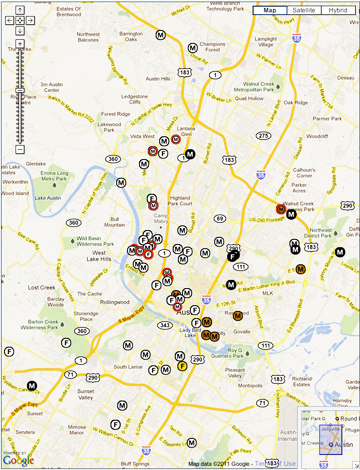Top Stories
Profile: Doug Greco for mayor
Court halts $354 million development subsidy
Latest articles
E-communication policy established for city employees
Employees’ Electronic Communications
Open Government Legal Experts Say Policy
by Ken Martin
© The Austin Bulldog
 City Manager Marc Ott approved a policy August 4 that establishes city accounts as the primary means for the city’s 12,000 employees to electronically communicate about city business. The policy was transmitted to employees through an Administrative Bulletin drafted by the Human Resources Department.
City Manager Marc Ott approved a policy August 4 that establishes city accounts as the primary means for the city’s 12,000 employees to electronically communicate about city business. The policy was transmitted to employees through an Administrative Bulletin drafted by the Human Resources Department.
The City Council ordered the city manager to devise a policy for employees’ electronic communications in a resolution unanimously adopted April 7. (See The Austin Bulldog’s April 15 report.) The resolution also directed the City Clerk to devise a policy for board and commission members’ electronic communications. (More about that later.)
If circumstances require communicating about city business on a personal communication device or account, that correspondence should be forwarded to a city account, the policy states.
However, the policy grants employees permission not to forward communications if they personally determine that “there is no administrative value in retaining the communication.” This determination is supposed to be made by employees after consulting the “applicable records retention schedule.”
The “Administrative Value retention period” is defined in the Bulletin as “generally associated with routine or administrative business documents. The retention period is tied to the usefulness of the records for the conduct of current or future administrative business.”
The employee communication policy applies to, but is not limited to, e-mail messages, text messages, images, and attachments.
 Joe Larsen, a volunteer hotline attorney with the Freedom of Information Foundation of Texas and last year’s recipient of the foundation’s prestigious James Madison Award, is an expert in the state’s open government laws. Larsen praised the city manager’s policy and pointed out some improvements that could be made.
Joe Larsen, a volunteer hotline attorney with the Freedom of Information Foundation of Texas and last year’s recipient of the foundation’s prestigious James Madison Award, is an expert in the state’s open government laws. Larsen praised the city manager’s policy and pointed out some improvements that could be made.
“I’ve never seen any other city in Texas with a policy that would require a city employee to forward electronic communication from a personal account,” said Larsen, special counsel to the Houston-based international law firm of Sedgwick, Detert, Moran and Arnold LLP. “I would have to go on the record in saying I think it’s a good-faith effort to address a complicated problem.”
Is the City of Austin unique in adopting such a policy? The Austin Bulldog sought a comment from Bennett Sandlin, executive director of the Texas Municipal League. The TML website states the organization has more than 1,100 member municipalities, including 34 with a population of 100,000 or more.
Sandlin replied via e-mail, stating, “I’m not going to comment on a specific member city issue.”
Sandlin has, however, previously commented for publication concerning the issue at hand. An e-mail attributed to Sandlin was quoted in a January 12 Texas Watchdog article. Sandlin’s e-mail acknowledged that “...public business e-mails on private accounts are indeed public information.”
Larsen and three other attorneys who are experts in the state’s open government laws say the city manager’s policy for employee communication is flawed and raises serious issues about whether the policy will bring the City of Austin into compliance with the Texas Public Information Act.
Flaws in Ott’s policy
At-Large Elections Favor Anglo Choices
Forty Years of Election History
Expose Extent of Disparities
by Ken Martin
© The Austin Bulldog 2011
It should come as no surprise that the greatest political power is exercised by those whose wealth, influence, and avid participation enable them to move the levers of democracy in their favor.
 The extent to which this is true in Austin is laid bare by maps constructed by The Austin Bulldog that pinpoint the residential location of every mayor and council member elected over the last four decades.
The extent to which this is true in Austin is laid bare by maps constructed by The Austin Bulldog that pinpoint the residential location of every mayor and council member elected over the last four decades.
The unalterable fact that emerges is that large parts of Austin are not represented—or are grossly underrepresented—because of the at-large system of elections established by the Austin City Charter.
This is not a new revelation. Attempts to gain voter approval for some form of council districts that would provide for equitable geographic representation have been put on the ballot six times, beginning in 1973, and six times failed to win majority support.
The ship of democracy continues to sail in the direction ordered by the majority. Which is how democracy is supposed to work.
But at what cost to those who feel disenfranchised by Austin’s at-large election system? The at-large system effectively means that all citizens—all 800,000 of us—are represented by every member of the city council. This system fails to make any one council member responsible for our concerns, or those of our neighbors. When every council member is responsible to every citizen, by definition, no one council member is responsible to a particular citizen.
The Austin City Council and a growing coalition of citizens are separately working on two different plans to give voters another opportunity in 2012 to approve a City Charter change to require the majority of city council members to be elected from geographic districts.
Based on what’s been discussed so far, these two initiatives differ significantly regarding how many council districts would be proposed, what procedure would be used for drawing district lines, the length of council terms, and whether terms would be staggered.
Both initiatives are still in the formative stages.
The City Council is scheduled to approve a resolution today (Item 28 on the agenda) to establish a 2012 Charter Revision Committee composed of 15 members who shall be appointed no later than August 25. The committee’s recommendations for charter amendments, and a map that includes any combination of at-large and geographic representation, are due by January 31.
The city’s plan or the grass-roots plan, or both, could wind up on the ballot next year.
But it should be noted that this appears to be the first time that a broad coalition of community organizations have launched a serious effort to formulate a plan that is independent of whatever proposal the city council puts forward, according to those involved in previous election campaigns for council districts.
None of the six failed propositions got on the ballot through a grass-roots petition drive. In the past, voters have only been able to react to whatever plan the city proposed—and the reaction has always been unfavorable.
Why geographic representation?
City Council’s Stealth Pay Raises
Fly Under the Public Radar
County Commissioners Court Raises
Require Published Notice, Signed Approval
by Ken Martin
© The Austin Bulldog
 The Austin City Charter (Article 1, Section 2) establishes the city council as the city’s policy making body. But when it comes to giving themselves a pay raise, the mayor and city council members are just part of the rank and file.
The Austin City Charter (Article 1, Section 2) establishes the city council as the city’s policy making body. But when it comes to giving themselves a pay raise, the mayor and city council members are just part of the rank and file.
When city employees get a raise, so do council members—automatically, without any public disclosure required.
The mayor and council members have obtained three such raises in the last four years. While the cumulative amount of these recent raises has been relatively small, the process is far from transparent.
From 2000 to 2010, the mayor’s salary has increased 124 percent, council members’ 109 percent.
Adding to the lack of transparency, salaries for the mayor and council members are not posted anywhere on the city’s website, a fact confirmed by the city’s public information office. Council payroll documents for the past five years were obtained by The Austin Bulldog through submission of an open records request and payment of $127 in fees to retrieve and search boxes of older records. Because of the city’s inadequate initial response to the request, incomplete records, and the city’s changing methodology for documenting council pay changes, clarity was achieved only after submitting numerous follow-up e-mails to city officials to obtain answers.
The city’s current system of pay raises for the mayor and council members was established November 16, 2006, when the council led by Mayor Will Wynn voted unanimously to pass Ordinance 20061116-081. This ordinance grants future raises to the mayor and council members “...equal to the base percentage amount established for ‘meets expectations’ compensation adjustments for non-Civil Service employees.” (Only police and firefighters are civil service employees and their pay is determined by contracts. The rest of the city’s 12,000 workers are not civil service employees.)
 Tom “Smitty” Smith is director of Public Citizen Texas, a nonprofit group that addresses a broad range of public policy issues, including what it calls "clean government” by working to hold public officials accountable.
Tom “Smitty” Smith is director of Public Citizen Texas, a nonprofit group that addresses a broad range of public policy issues, including what it calls "clean government” by working to hold public officials accountable.
“I think Austin City Council members should be well paid, comparable to the other 20 large metropolitan cities in the United States,” Smith says, “because it’s more than a full-time job.
“But council members pay raises should not be done through subterfuge,” Smith says.
Smith says the Texas Legislature is an example of more extreme subterfuge. When our low-paid lawmakers vote to raise judicial salaries they are actually voting to raise their own retirement pay, because their retirement pay is pegged to judicial salaries.
The preferred way to address salaries for council members, Smith says, is for the city auditor or some other disinterested official to establish a citizens committee removed from council influence that would study compensation issues and make recommendations for the council to adopt.
While the City of Austin’s methodology is opaque, this below-the-radar procedure is permitted by Local Government Code Section 141.004, which states, “The governing body of a home-rule municipality may set the amount of compensation for each officer of the municipality.”
County commissioners are much more closely regulated. In fact, Local Government Code Section 152.013 requires newspaper publication of a notice of any salaries, expenses, or allowances that are proposed to be increased for all elected county or precinct officers—including the amount of proposed increases—more than 10 days before the commissioners court meets for a budget hearing and adopts the budget. To view the ad published for the current fiscal year click here.
County commissioners must publicly vote on these proposed pay increases. Then, each member of the commissioners court must personally sign the order setting salaries for elected officials, including their own. To see the order for the current fiscal year click here.
Council raises 2000 to 2010
City E-mail Policies Still Not Implemented
Implementing Lawful E-mail Practices
City Employees, Board and Commission
Members Still Not Covered by City Policies
by Ken Martin
© The Austin Bulldog 2011
Nobody knows how many e-mails that constitute public records are escaping collection and retention for public disclosure while the City of Austin delays implementing policies ordered by the city council in its April 7 resolution. (See The Austin Bulldog’s April 15 report.)
It’s possible that thousands of e-mails that are public records may have been exchanged without copies being retained as required by the Texas Public Information Act and the Local Government Records Act.
Today, more than three months after the council voted unanimously to pass the resolution, no policies have been enacted to require retention of e-mails about city business that the city’s 12,000 employees and 365 board and commission members send or receive on their personal e-mail accounts.
As a result, government in the shadows continues unabated.
 Attorney Bill Aleshire of the Austin law firm Riggs Aleshire and Ray PC, who is The Austin Bulldog’s attorney in its lawsuit concerning the city’s violations of the Texas Public Information Act, said of this lack of progress, “The first mistake the council made was being suckered by the city attorney into believing the council cannot make policy that applies to all city employees.
Attorney Bill Aleshire of the Austin law firm Riggs Aleshire and Ray PC, who is The Austin Bulldog’s attorney in its lawsuit concerning the city’s violations of the Texas Public Information Act, said of this lack of progress, “The first mistake the council made was being suckered by the city attorney into believing the council cannot make policy that applies to all city employees.
“The second mistake was not recognizing that any record made or received in the transaction of city business should have been included in the city’s record and be subject to disclosure under the Texas Public Information Act,” he said.
The lack of e-mail policies to address communication about city business on personal devices has persisted for many years—even for the mayor and council members. The council resolution established a new policy for the mayor and council members, and the handful of employees that the council directly hires: the city manager, city clerk, city auditor, chief judge of the municipal court, and municipal court clerk.
The city council resolution also tasked City Manager Marc Ott with developing a policy that applies to city employees, and City Clerk Shirley Gentry with developing a policy for members of sovereign boards and commissions. The council asked for progress reports within 30 days.
In response to three separate open records request for copies of the city manager and city clerk’s progress reports, and an interview, The Austin Bulldog obtained the following information:
2009 Austin City Council E-mails
Private Deliberations and Political Maneuvering
More than 2,400 Pages of 2009 E-mails
Published Here in a Searchable Format
© The Austin Bulldog 2011


 The schisms within the Austin City Council that surfaced during the runoff election between incumbent Council Member Randi Shade and challenger Kathie Tovo were a revelation, as the other incumbents split evenly in lining up to support Shade or Tovo.
The schisms within the Austin City Council that surfaced during the runoff election between incumbent Council Member Randi Shade and challenger Kathie Tovo were a revelation, as the other incumbents split evenly in lining up to support Shade or Tovo.
Such passionate and public election advocacy among sitting council members is rare, if not unprecedented. The election outcome created deep political wounds in need of healing, not only for personal relations among council members but also for making good public policy when the council’s summer hiatus is over in three weeks.
The thousands of e-mails written in 2010 and January 2011 obtained through open records requests and The Austin Bulldog’s lawsuit, published May 12, foreshadowed some of the differences that surfaced in this runoff election. But the e-mails exchanged by council members in 2009, published here, show the roots of dissent among council members goes back much further.
The latest batch of more than 2,400 e-mails obtained through an open records request raise new issues—not only for what these e-mails reveal, but also because of what was withheld.
Some of these records show council members communicated among themselves about city business in numbers equaling or exceeding a quorum, a possible violation of the Texas Open Meetings Act.
Some of the council members also deliberated through their private e-mail accounts about a $250 million city project that was under consideration.
As for what was withheld, two (not four, as first reported) council members failed to provide copies of e-mails about city business conducted on their personal e-mail accounts during calendar year 2009: Sheryl Cole and Mike Martinez. (Deleted Chris Riley and Randi Shade.)
To withhold private e-mails about city business flies in the face of at least four open records opinions issued by the Texas Attorney General, which state that e-mails about government business that were created or received on personal accounts are public records (OR2003-0951, OR2003-1890, OR2005-01126, OR2005-06753) and thus are subject to release under the Texas Public Information Act.
As reported March 2, The Austin Bulldog filed a lawsuit against the mayor, council members, and City of Austin because of the failure to release copies of personal e-mails about city business exchanged by the city council during calendar year 2010 and January 2011. As a result, the mayor and council members eventually relented and released at least some of those e-mails.
For e-mails sent or received in 2009, Mayor Lee Leffingwell and Council Members Laura Morrison, Chris Riley, and Randi Shade released personal e-mails about city business and Council Member Bill Spelman released city business e-mails from his University of Texas account. As in the earlier releases forced by the lawsuit, the city characterized these actions as being voluntary. (Update July 7, 2011: Click here to see the cover letter provided by the City of Austin that accompanied the 2009 e-mails released by the city.)
The bottom line is the other city council members continue to take the position that they need not turn over e-mails about city business conducted on personal accounts. This position is inconsistent with the e-mail policy the city council adopted in an April 7 resolution that applies going forward. (See The Austin Bulldog report of April 15.)
Investigative Reports
For more than a decade the Bulldog has published hard-hitting, in-depth investigative reports that have shaped civic discourse and public policy, resulted in criminal prosecutions, and enlightened voters about candidates' records. Here are a few samples of our work:
About us
The Austin Bulldog is the premiere investigative journalism outfit in Central Texas. Established in 2009, the Bulldog has become a trusted independent voice for government accountability, known for its incisive, in-depth coverage of local elections and local governments.
Newsletter
Keep up with the best investigative reporting in Austin.
Follow us
Bulldog Team
Ken Martin
Founder and EditorOur critical accountability journalism wouldn't be possible without the generous donations of hundreds of Austinites. Join them and become a supporter today!
Areas of Coverage
Austin City Manager: Dallas discard vs Austin retread
Lame duck council set to vote on 20-year sweetheart tax deal for developer
Environmentalists assail plan for lakeside high rises
Urbanists vie to replace council member Kathie Tovo
First-ever opportunity to elect appraisal board members
Announcing the Government Accountability Project
Central Health launches search for new CEO
First-ever opportunity to elect appraisal board members
Announcing the Government Accountability Project
Project Connect
Lawmakers weigh axing Project Connect’s ‘blank check’ loophole
Project Connect scope drastically scaled back
Austin Transit Partnership gears up for key decisions on light rail design
Become a Bulldog supporter
The Bulldog is funded by its readers. We're not affiliated with any political party or interest group. We're not paid by corporate sponsors. Support us today so we can continue to be a trusted voice for government accountability.
Newsletter
Keep up with the best investigative reporting in Austin.
© The Austin Bulldog. All rights reserved.
2028 E. Ben White Blvd. #240-6115 Austin TX 78741







